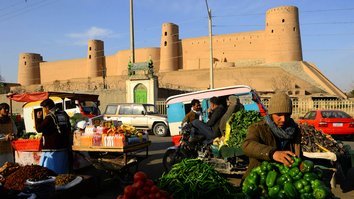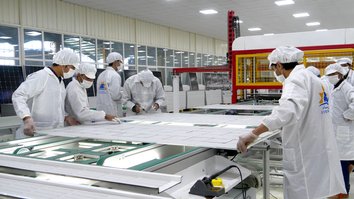HERAT -- The dumping policies of neighbouring countries, especially Iran, have led to the recent shutdown of eight factories in the Herat Industrial City, according to authorities and industrialists in Herat Province.
The factories produced cake, cookies and marble and employed hundreds of workers.
Several factories in the Herat Industrial City have been affected by the dumping policies of neighbouring countries, discouraging investors and industrialists, said Hamidullah Khadem, the director of the Herat Chamber of Industries and Mines.
The eight factories were forced to cease operations in less than a month, he said.
![A marble-tile processing machine sits idle September 2 at a marble factory in the Herat Industrial City because of Iranian dumping policies. [Omar]](/cnmi_st/images/2020/09/14/26061-s_1-585_329.jpg)
A marble-tile processing machine sits idle September 2 at a marble factory in the Herat Industrial City because of Iranian dumping policies. [Omar]
"Afghanistan has become self-sufficient in 27 sectors, all of which are functioning in the industrial park," he added. "Tariffs imposed by the government on similar products from outside helped in the growth of these products."
These sectors produce salt, biscuits and cake, beverages, marble and other goods.
"But similar products are being imported daily from neighbouring countries, especially from Iran, which has led factories to the verge of collapse," he added.
The Herat Industrial City has become a sore point for the Iranian regime, and with the support of warlords and mafia groups, the country aims to cripple it, according to Abdul Raziq Timori, director of Sakhawat Timori, a cake-producing company.
"Neighbouring countries deliberately export similar products to Afghanistan so that our domestic industries and products cannot grow," he said.
They do not want to see industries in Herat Province grow; therefore, they export their low-quality products through different routes and sell them at low prices that Afghan competitors cannot match, he added.
Iran’s destructive economic policies
Fortunately, the Afghan government is working to combat the dumping policies of neighbouring countries, say local officials.
The illegal export of similar products from neighbouring countries to Herat is a serious issue and the fight against it has started, Herat Governor Sayed Wahid Qatali told media on August 28.
"We are committed to preventing by all means the import of products to Afghanistan when they are produced domestically in the Herat Industrial City," he said. "We strongly urge Afghan importers not to import similar products, and they will face the consequences, should they continue doing so."
"Several factories in the industrial park have been severely affected by the import of similar products and destructive policies of neighbouring countries in recent years, and they could not compete," Qatali said.
"We will not allow any country to harm our industries, and we will combat the destructive policies of neighbours," he added.
Tehran is facing severe economic problems due to the sanctions imposed on it by the international community, leading it to attempt to dump its products on Afghan markets, said Mohammad Yaqub Mashouf, an economic analyst in Herat.
"Dumping policies are very dangerous and can easily destroy new Afghan industries. To capture the Afghan market, Iran first sells its products very cheaply, but once the factories in the industrial park are closed, it raises the prices of its products many times over," he said.
"The Afghan government must seriously combat the dumping policies adopted by neighbouring countries," said Mashouf.
"If it [the problem] is not tackled, domestic industries and products will lose the ability to compete with imported products and will eventually collapse," he added.
Paralysing Afghan industries
Of the 500 factories in the Herat Industrial City, more than 200 have ceased operations because of cheap imports and the dumping policies of the Iranian government, according to Herat authorities.
A number of industrialists whose factories were forced to close in Herat Province called on the Afghan government to prevent the neighbouring regime's destructive activities.
Low-quality, cheap Iranian stone arrives in Herat and the high-quality domestic stone cannot compete with it, said Abdul Qayoum Alizada, director of a marble factory in Herat.
"I have invested more than $600,000 (46 million AFN) in this factory. It used to produce 35 metric tonnes of marble each day, employing 50 workers. But now we don't have even a single worker, and our machinery has been shut off for the last couple of weeks," he added.
The stone from Iran is of very low quality, which cannot be compared to Afghan stone, but since it is cheap, customers prefer it, Alizada said.
Iranian stone arrives via illegal routes, with the Afghan government being unable to collect customs duties, and is sold in markets for very little, said Wais Wardak, director of another marble factory in the Herat Industrial City.
"We used to have 40 workers producing and processing more than 20 metric tonnes of stone per day, but now we have zero workers. We do not produce now, and our machinery has been turned off," he said.
"Iranian stone is deliberately exported to Afghanistan, and this has resulted in the closure of our factories," he added. "Low-quality Iranian stone is hampering the reconstruction and infrastructural development of Afghanistan."








Afghan people do not support their domestic products. If the people of Afghanistan would support their domestic products and never buy the goods that come to Afghanistan from our neighboring country Iran, the Afghan businessman will be forced to stop importing goods from Iran. Suppose one thing that, I experienced myself. I needed to paint my house. I told the painter to come with me in order to buy the paint. The painter told the shopkeeper, do you have Pakistani color? The shopkeeper said no. I don't have Pakistani color, but I have the color produced in our country, it is also of high quality. And if its quality was bad, I will give your money back. The painter said no. I want Pakistani color. Here, inside a can of Pakistani paint, there is a prize of AFN 100, which goes to the pocket of the painter. And there is no award in the color of our own production. Also, all of the construction stuffs are sold on commission. The plumber, electrician, tile work, paint, all demand commission from the shop. In Afghanistan, quality is not important, but any shopkeeper who gives more commission to a worker is said to be selling quality stuff. Most of our traders deliberately import poor quality goods from the neighboring countries including low-quality food, medicine, and even baby milk. The problems that manufacturing plants have is the problem of electricity that our manufacturing plants do not have 24-hour electricity. Because of this electricity shortage, many factories are closed.
Reply5 Comment
Salaam, I agree with all your words, but the point is that the Afghan production factories do not accept less benefit. Go and check how much benefit they gain. Now they are saying that Iranian products are of low quality. See and judge yourself, whether foreign goods have good quality or internal goods. People have eyes; they see and buy them. The food material which comes from Iran needs fare, custom, traders’ benefit, wholesaler's benefit, partial sellers’ benefit. All these need expenses. Why shouldn’t internal products have expenses for them? All these things should be checked, to find whether people have good economic condition, and the factories gain more benefits. If you see, all factory owners have high buildings; they have best cars. Their families live abroad. These factories do not content with less benefit. The thing is that Iran did not put their goods on sale. Iranians receive their money one month before they sell their goods. Then they load the goods and send them. If Afghan factories operate properly and receive less benefit, no trader will sell foreign goods here.
Reply5 Comment
Importing Iranian goods into Afghanistan has really paralyzed the country's factories. We thank your media outlet for covering such an important and real topic. Other media outlets do not publish on such topics. They always publish topics of war and killing. Either these media outlets are not interested in covering such topics that you published, or they may be funded by foreign countries and publish reports at the request of the malicious countries. Imports of Iranian goods into Afghanistan has turned into a major problem for traders and industrialists. They have sustained great losses over the past few years. Instead of preventing imports of the foreign goods and encouraging domestic products and persuading people to buy domestic products, the government is allowing merchants to import Iranian goods into Afghanistan. Such a situation will inflict heavy economic blows on the country and its traders. We ask the government and the international community to invest in the manufacturing sector in Afghanistan and to cooperate with private factories so that we have domestic products and our country can prosper.
Reply5 Comment
The Afghan government should ban imports of any Iranian goods into the country. Currently, Iranian goods are more in the country's markets than Chinese goods, which constituted 80% of all foreign goods of Afghanistan in the past. Interest in buying Iranian goods in the country is growing rapidly and the people of Afghanistan admire Iranian goods more than Chinese goods, because the quality of Iranian goods is better than Chinese and Pakistani goods. All the money that Iran earns by exporting Iranian goods to Afghanistan is spent on financing terrorist groups, which even worsens the situation of Afghanistan. All Iranian and Pakistani goods must be sanctioned in the markets of Afghanistan by both the government and the citizens of the country. The government should clearly tell Pakistan and Iran that their goods will be banned inside Afghanistan until the two countries do not stop interfering in Afghanistan. And the merchants who import Iranian and Pakistani goods into Afghanistan should be fined.
Reply5 Comment
These activities of Iran should be considered terrorism activities. Iran and Pakistan are trying to prevent progress in Afghanistan at any cost. Iran and Pakistan want to make Afghanistan a selling market for their products.
Reply5 Comment